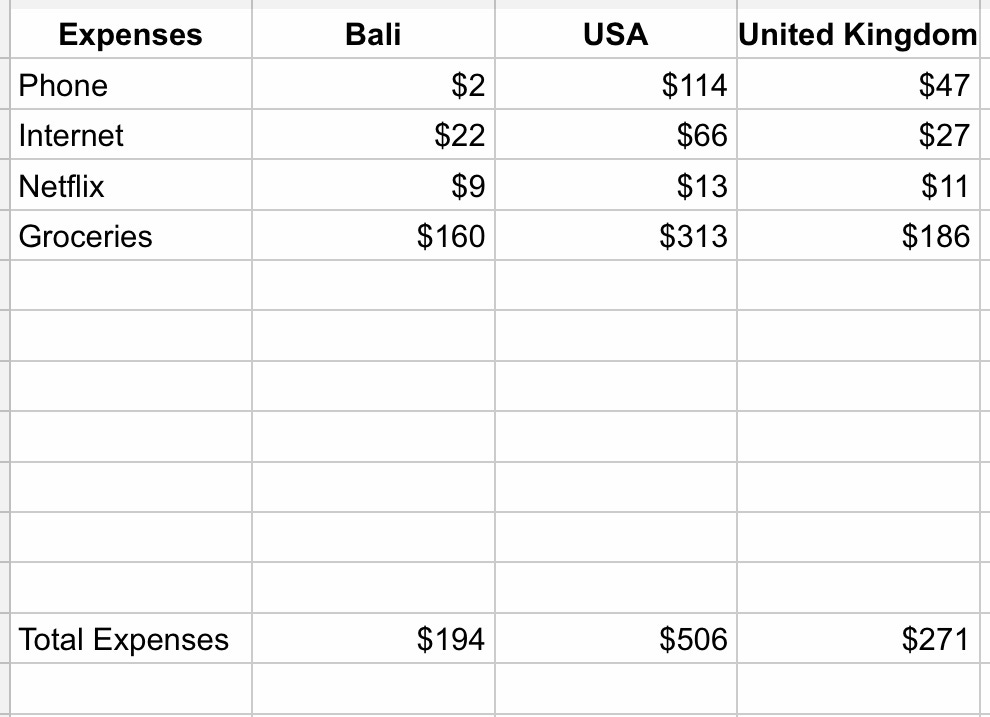As with most things, each of us has a definition of what comprises domestic living. For some domesticity is a roof over our head and a bed to sleep on. For others it’s the familial hub from which everything else flows out of.
This email will deal with groceries. I will assume that you eat a good number of meals at home. However, in Bali, if you were to eat at the local warungs (food stands / small restaurants), your costs would most likely be equivalent or even less than buying food from the tourist/expat supermarket and eating at home. But we will discuss eating out in another email.
If you were to look at the spreadsheet below (from numbeo.com) you might think, “For a 22% savings, I might as well stay in the USA (or replace USA with whatever developed country you’re from).” The USA numbers are from the most average city in the USA, Tulsa, OK.

There are some items worth discussing for someone who is really considering a life in Bali: cheese and alcohol (except for local beer) are very expensive.
I now eat about 10% of the amount of cheese I used to eat in the USA. And having lived in the second best county for wine making in California, Sonoma County, I have curtailed my wine consumption to perhaps 10% of what I drank in California. :(
Am I really sad about it? No. I even gave up coffee, although Java coffee from our neighboring island is cheap and quite decent. But here’s the thing: why do I need to be wired up with caffeine each morning? I’m in Bali! I’ve got all day to do whatever I want. What’s the rush? I take a long, early morning walk, and drink lemon water when I return home. I’m as awake as I need to be. Keep in mind that needing coffee is the result of marketing, not the natural state of your body shouting at you to wake up.
Another thing to keep in mind is that Bali is tropical. So most tropical fruit is easy to come by and very reasonably priced. You don’t want to hack off the top of a coconut with a sharp blade? No worries. You can have freshly bottled coconut water delivered to your door with a Go-Jek driver for $1 per bottle (order 5 bottles at $1 each and delivery is free). Go-Jek is the equivalent of Uber but on a scooter, and with maybe 15 other services besides food delivery.

Above photo: Mangoes with coconut cream. In-season mangoes are a heavenly bargain.
The point of sharing my personal experiences is that I’ve made significant changes to my diet now that I’m an expat. I still have a beer most evenings, but it’s the local pilsner, Bintang (owned by Heineken), $1.70 at the supermarket or $1.10 if you buy a case of 24 bottles at a supplier (includes delivery).
If you want to live a very similar life to the one you have in your developed country, I recommend that you think twice about moving.
Making a big, life-changing decision about living in a developing country in order to obtain the financial freedom you desire will necessarily include lifestyle changes. But rather than getting all bent out of shape about not having your favorite bottle of Pinot Noir, just imagine not having a boss, not needing a job, and not being financially dependent on anyone other than yourself.
Here’s a money-saving tip:
Have your housekeeper (yes you can have a part-time or full-time housekeeper) shop at the local market (pasar) for you. (I will discuss the hiring of domestic help in another email). If you go shopping with her there’s a very good chance you will be paying more than if she goes by herself. In order to train your housekeeper you can go together to the local market and teach her what you like. But after that one time let her do the shopping at 6:30 or 7am and she will get the freshest food at the lowest possible prices.

Above photo: Mengwi open air pasar (local market)

The spreadsheet now includes monthly groceries (all items are for one person). The $160 represents approximately 60% of meals at home. We will discuss restaurants in another email.
The USA numbers are from here, and the UK numbers are here.
Later,
Neill



